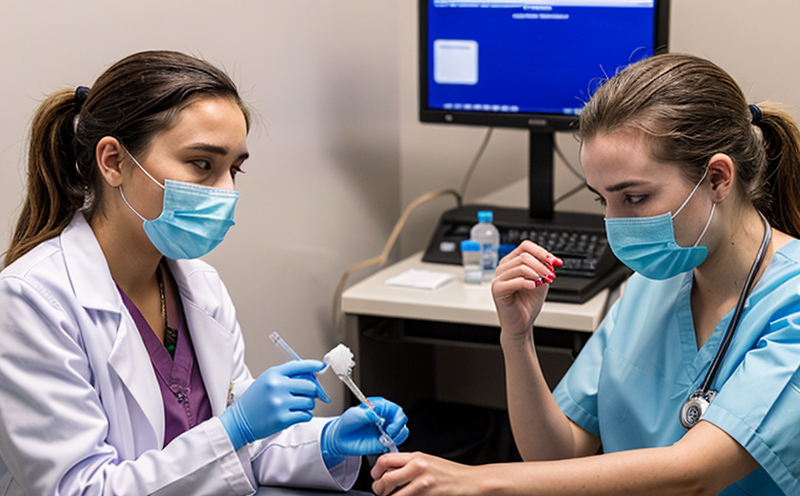ASTM E2809 Nucleic Acid Amplification Testing in Clinical Microbiology
The standard ASTM E2809 defines a framework for the validation and performance evaluation of nucleic acid amplification tests (NAATs) used in clinical microbiology. This service ensures that laboratories are equipped to accurately identify, quantify, and characterize microorganisms responsible for various infections through advanced molecular techniques.
NAATs represent an evolution in diagnostic testing, offering unparalleled sensitivity and specificity compared to traditional culture-based methods. They are particularly useful in detecting low-abundance pathogens, rapid diagnosis of infectious diseases, and monitoring antibiotic resistance genes (ARGs). ASTM E2809 provides a structured approach to ensure that the performance attributes of these tests meet stringent quality requirements.
The standard encompasses key aspects such as sample preparation, nucleic acid extraction, amplification, detection, and result interpretation. It also emphasizes the importance of cross-contamination prevention, calibration, and proficiency testing to maintain consistent accuracy across different laboratories.
ASTM E2809 outlines critical performance metrics including analytical sensitivity, specificity, reproducibility, and turnaround time (TAT). These parameters are essential for ensuring reliable results that can be relied upon by clinicians for patient management decisions. The standard also highlights the need to validate NAATs against a wide range of clinical specimens, including blood cultures, cerebrospinal fluid, urine, and respiratory tract samples.
Implementing ASTM E2809 ensures compliance with international standards, which is crucial in maintaining high-quality laboratory practices and patient safety. Laboratories that adhere to this standard demonstrate their commitment to providing accurate, reproducible, and timely diagnostic information for a variety of infections including but not limited to sepsis, meningitis, urinary tract infections (UTIs), and respiratory syndromes.
Understanding the nuances of ASTM E2809 is vital for quality managers, compliance officers, R&D engineers, and procurement professionals involved in clinical microbiology. Familiarity with this standard helps organizations stay ahead of regulatory changes and ensures robust laboratory operations aligned with global best practices.
Benefits
- Improved Accuracy: Ensures high sensitivity and specificity, reducing false positives and negatives.
- Faster Results: Shorter turnaround times compared to traditional culture methods.
- Better Detection: Capable of identifying low-abundance pathogens not detectable by other means.
- Informed Decision-Making: Provides critical data for effective patient management and antibiotic stewardship.
- Patient Safety: Minimizes the risk of misdiagnosis and inappropriate treatment, enhancing overall health outcomes.
- Regulatory Compliance: Ensures adherence to international standards, facilitating smoother operations and audits.
- Cost Efficiency: While initial investment is high, long-term savings are realized through reduced retesting and improved patient care.
Quality and Reliability Assurance
The ASTM E2809 framework emphasizes the importance of quality assurance (QA) and reliability in NAATs. Laboratories must implement robust QA protocols to ensure consistent test performance. This includes strict calibration procedures, regular proficiency testing, and ongoing staff training.
Calibration is critical for maintaining accurate results during nucleic acid extraction and amplification processes. Regular proficiency testing ensures that the laboratory's methods are comparable with national or international standards. Staff training in molecular biology techniques and bioinformatics analysis further enhances the reliability of NAATs.
The standard also outlines the importance of aseptic technique to prevent cross-contamination between samples, which can lead to erroneous test results. Laboratories should establish stringent protocols for sample handling, storage, and disposal. Additionally, regular equipment maintenance is essential to ensure that all instrumentation operates within specified tolerances.
Quality control measures are also crucial in maintaining the integrity of NAATs. This includes the use of positive and negative controls during each test run, as well as the implementation of internal quality checks at various stages of the process. By adhering to these stringent protocols, laboratories can ensure that their NAAT results are reliable and trustworthy.
Compliance with ASTM E2809 is not only a regulatory requirement but also a key factor in maintaining public trust. Laboratories that comply with this standard demonstrate their commitment to providing accurate, reproducible, and timely diagnostic information, which is essential for patient safety and effective treatment.
Use Cases and Application Examples
| Use Case | Description |
|---|---|
| Sepsis Diagnosis: | Detection of pathogens in blood cultures to identify sepsis early, allowing for timely treatment. |
| Meningitis Detection: | Identification of bacteria or viruses causing meningitis from cerebrospinal fluid samples. |
| Urinary Tract Infections (UTIs): | Detection of uropathogens in urine samples, aiding in the selection of appropriate antibiotics. |
| Pneumonia: | Identification of respiratory pathogens from respiratory tract specimens for accurate diagnosis and treatment. |
| Antibiotic Resistance Monitoring: | Detection of antibiotic resistance genes (ARGs) in clinical samples to guide antibiotic use. |
| Hospital-Acquired Infections: | Detection and characterization of pathogens responsible for hospital-acquired infections, facilitating infection control measures. |
| Point-of-Care Testing: | Rapid diagnosis of infectious diseases at the point of care, improving patient outcomes. |
The use of ASTM E2809 ensures that NAATs are validated for these critical applications, providing reliable and actionable data for clinicians. This standard plays a pivotal role in enhancing diagnostic accuracy and informing effective treatment strategies across various healthcare settings.





